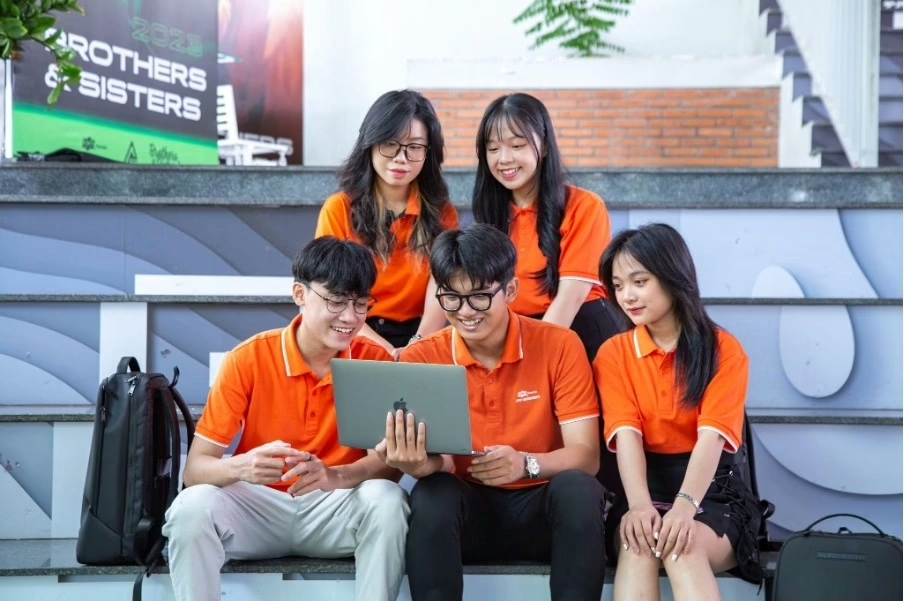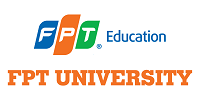Asking “how AI can support this task” before taking action – the AI First mindset – can become a professional reflex that boosts efficiency, according to Nguyen Duc Minh Quan, deputy head of digital transformation at FPT Retail.
This insight was shared during the livestream “Confidently stepping into the AI era – starting with your chosen field” hosted by FPT University (FPTU) on July 8. The event is part of the “Prompt your Future” initiative. The program featured two guest speakers who are also FPTU alumni: Le Binh Trung, director of admissions at FPTU, and Nguyen Duc Minh Quan, deputy head of digital transformation at FPT Retail.
The session provided insights into the impact of AI on the labor market and university admissions, offering future-oriented guidance to students born in 2007, who are at a crucial crossroads in choosing their field and university.
The rapid advancement of artificial intelligence is transforming how people work. As a result, the appeal of a field is no longer solely determined by market trends but increasingly by its ability to integrate and apply technology – especially AI.
According to Nguyen Duc Minh Quan, in the digital age, any profession can become a “hotspot” if learners know how to leverage technology to boost productivity. AI doesn’t replace people – it replaces those who don’t know how to use it.
“I use AI daily for report generation, meeting summaries, and slide creation. Thanks to AI, I save time on repetitive tasks and focus more on specialized work,” he shared.

For Quan, asking “How can AI assist with this task?” has become second nature – a core part of the AI First mindset. Workers who can operate, guide, and respond effectively to AI will hold a major advantage in today’s competitive landscape.
Echoing this view, Le Binh Trung emphasized that the AI era is much like past industrial revolutions: those who fail to adapt will be left behind. AI inspires innovation and brings wide applications – creating both challenges and opportunities. Those who master it will take the lead in shaping a knowledge-based economy.
“Students born in 2007 are a golden generation. You are the core force in the nation’s rise during this digital age. See this as your chance to engage, learn, and take command of technology,” he stressed.
24 majors integrated with AI
With an AI First orientation, FPT University is implementing training programs that deeply integrate technology across all 24 majors, helping students grow in both expertise and digital capability.
According to Le Binh Trung, AI First is not just about introducing AI into the curriculum – it is a guiding philosophy spanning management, teaching, and learning. Educators must use AI themselves to understand its capabilities and then choose the right pedagogical approaches to help students apply it effectively in each field.
Since 2006, FPT has clearly defined that “technology is no longer exclusive to IT” – it is the foundation across all sectors. Even before the AI boom, FPTU had proactively embedded technology into at least 20% of the general knowledge content in every academic program, from IT, business, and communication to areas once seen as unrelated, like logistics or design.

“In digital art design, FPTU students learn about VR and AR. In tourism, they explore virtual travel through panorama technology. When ChatGPT emerged, we immediately dissected it and updated our curriculum to ensure no student is left behind,” Trung said.
Beyond academics, the AI First mindset is also built into orientation week. New students are guided to set up their own AI-powered learning assistants using ChatGPT, learn about AI ethics, and are introduced to two core AI tools that support their studies throughout their four years at FPTU.
Three training advantages at FPT University
Le Binh Trung also highlighted three key advantages of FPTU’s training model.
First is real-world internship experience starting in the sixth semester. Students work at major enterprises during the on-the-job training (OJT) program in year three, allowing them to apply academic knowledge, refine professional skills, and improve adaptability in the job market.
Second is the “sandwich model”, which alternates academic study with industry practice. This approach helps students stay current with industry trends. FPTU also implements interdisciplinary projects based on real business needs, encouraging students from different majors to work together on practical problems – strengthening application mindset and cross-disciplinary collaboration.
Finally, the university emphasizes self-learning and lifelong learning skills. In the digital era, the ability to self-learn is a key competitive factor. FPTU equips students with essential tools and methods to continuously update their knowledge, drawing from over 300 universities and global corporations worldwide.



